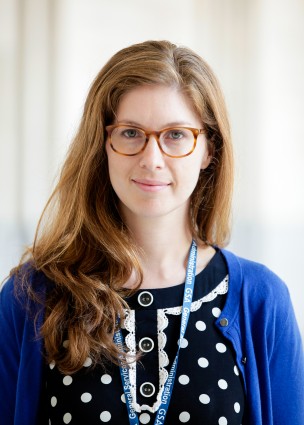
Nicole Eaton, Visiting Assistant Professor of History, hasn’t unpacked much in her office. Next semester, she’s off to Boston College, but for now, she’s making herself available during office hours in the Public Affairs Center. Eaton is the kind of glamorous academic that students adore, interspersing her lectures with references to her extensive research, her Facebook presence, her experiences at Mardi Gras, her time at U.C. Berkeley, and her love of sushi. Students not lucky enough to be in one of her classes this semester should seek her out just for an amazing conversation and a bowl of instant oatmeal.
The Argus: I can’t help noticing that your bookshelf is pretty much empty.
Nicole Eaton: That’s right. I’ve only been here a few weeks, and I brought maybe a tenth of my books. They’re all in suitcases in my apartment and it’s been either snowing or a busy day, so I haven’t brought them to my office.
A: You do have two books on the Russian Revolution, which makes sense [considering you teach “Stalinism” and “Imperial Russia, 1682-1917”]. Are the rest of your books at home on a similar theme?
NE: My actual bookshelf is [a] combination of novels I’ve read and thought I would loan to someone someday, and Russian, German, European history, history of philosophy, intellectual history, and critical theory. All the other books I end up selling [at] half price or giving away and so I keep a sparse bookshelf compared to a lot of professors.
A: Is that because you’ve been a visiting professor and traveling around?
NE: If you count summers, I’ve moved 35 times in 17 years. I haven’t lived somewhere for 12 straight months since 2010. I’ve been giving away my books, probably giving away 30 every time I move, just thinking, “Will I need this again?” The books I have, I’ll either teach with or were gifts or self help and nutrition books that I think someone might want from me one day or a really good novel that I want to share with someone.
A: Do the novels you read also have a sort of Russian/German historical bent?
NE: No, when I read novels I want to get away from the stuff I’m working on. I want to use a different part of my brain. I got really into Oulipo, which is a mid/late 20th century tradition of writing that combined science, math, poetry, and playfulness within formal constraints. I think the one work people have heard of, if not read, is a novel by Georges Perec written entirely without the letter ‘e.’ If you think about writing a novel, or a sonnet, every type of writing you do has a constraint. Even writing itself is a constraint. So these people thought you could do something beautiful, arbitrary, and playful if you create a constraint and then just go for it! I got really interested in this for a couple years: people writing short stories or poems that had to be completed in the time it took to go from one end of the subway line to the other, for example, or an exhaustive attempt to describe everything in sight and try to make it interesting to the reader. I got into it because it exposes what we do when we write and then try to tell a human story, too.
A: Has this influenced your writing?
NE: [Laughing] I like to think so, but I don’t know that any outside observer would see it. I think it’s influenced my writing in the sense that I recognize that even academic writing is not just information, but it’s an argument and a presentation of an argument and, every time we write, we write with those structures, and conventions and good writers are aware of those. I find that the best works of history [are] those that combine some of the aspirations of literature but then also tell a good human story.
A: In [your “Stalinism”] class you mentioned that you’ve written a book. Will you tell me about that?
NE: I am turning my dissertation into a book. It’s about a single city as it transformed. For 700 years it was Konigsburg, the home of Immanuel Kant, and now today it is the Russian city of Kaliningrad, and so I’m writing about the transformation of that city in the decade surrounding the Second World War as Nazis and Soviets and Stalinists and Germans and Russians and their victims came together and tried to figure out what would happen there. It’s a writing about place—it’s an urban history—but it’s also about people occupying the same space.
A: I would read it!
NE: I hope so! I hope it’s interesting.


Leave a Reply